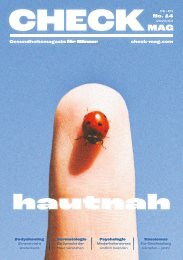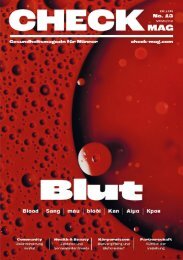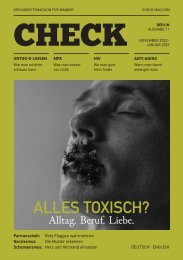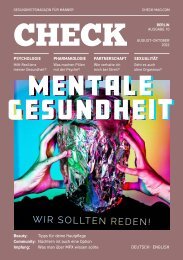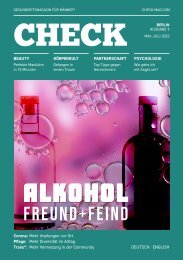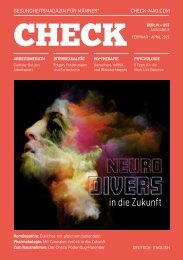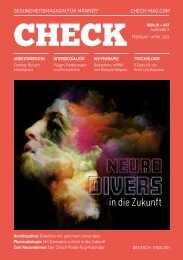CHECK Magazin - Gesundheitsmagazin für Männer No.12
Wenn wir, nicht erst seit gestern, von Ressourcen sparen reden, fällt oft die am nächsten liegende Ressource unter den Tisch: der Mensch. Auch wir sind nicht unerschöpflich belastbar, auch wir haben Grenzen. Mit dieser Ausgabe wollen wir uns daher ein bisschen befreien: Von Keimen, negativen Gedanken, dem Gefühl, nicht gehört zu werden, unnötigem Körperfett, Nahrung, die uns gestresster und ängstlicher macht, Krankheitsrisiken oder auch Scham.
Wenn wir, nicht erst seit gestern, von Ressourcen sparen reden, fällt oft die am nächsten liegende Ressource unter den Tisch: der Mensch. Auch wir sind nicht unerschöpflich belastbar, auch wir haben Grenzen. Mit dieser Ausgabe wollen wir uns daher ein bisschen befreien: Von Keimen, negativen Gedanken, dem Gefühl, nicht gehört zu werden, unnötigem Körperfett, Nahrung, die uns gestresster und ängstlicher macht, Krankheitsrisiken oder auch Scham.
Sie wollen auch ein ePaper? Erhöhen Sie die Reichweite Ihrer Titel.
YUMPU macht aus Druck-PDFs automatisch weboptimierte ePaper, die Google liebt.
Please explain to me again very briefly what<br />
the term “microbiome” means exactly. It has<br />
been haunting the media for some time now.<br />
Ramona: The term microbiome describes all of<br />
the microorganisms that live in and on an organism.<br />
So all bacteria, viruses, fungi and whatever else that<br />
creeps around. The gut microbiome is the name given<br />
to the specific bacterial population in the gut.<br />
And what do I need my gut<br />
microbiome for?<br />
Hamide: The microorganisms in the intestine<br />
are involved in practically all important bodily functions.<br />
They not only influence the entire metabolism,<br />
but also the immune system, hormone balance, sleep<br />
rhythm, skin condition and much more. Of course,<br />
they are also responsible for digestion. They break<br />
down and process our food and extract nutrients<br />
and energy from it. They produce various vitamins,<br />
neutralise toxic substances and prevent the spread of<br />
pathogenic germs.<br />
I wasn’t really aware that my gut exerts so<br />
much power. All I think about most of the<br />
time is that it’s digesting my food and unnecessarily<br />
increasing my fat deposits. How<br />
come we’re only now starting to talk about<br />
such an important topic?<br />
Ramona: Due to our changing lifestyle –<br />
more and more stress, unhealthy nutrition, increased<br />
use of antibiotics and generally increased use of<br />
drugs – our metabolism is becoming more and more<br />
stressed and the symptoms of a disturbed intestinal<br />
microbiome are increasing.<br />
This brings more focus to the role that gut bacteria<br />
play in our health. Research is being carried out<br />
more intensively and in various disciplines, and the<br />
findings from these studies are slowly finding their<br />
way into the usual treatment approaches and in the<br />
advice given in our pharmacy.<br />
Embodied knowledge<br />
What symptoms do I get when my gut<br />
microbiome is bad?<br />
Hamide: The most well-known symptom is<br />
the infamous diarrhoea during or after antibiotic<br />
therapy. Unfortunately, antibiotics cannot distinguish<br />
between the different strains of bacteria and<br />
always also attack our “good” intestinal bacteria. But<br />
abdominal pain, flatulence, constipation and diarrhoea<br />
in connection with antibiotic administration<br />
are also classic symptoms of a disturbed microbiome.<br />
Food intolerances such as lactose, fructose or gluten<br />
intolerance are just as much symptoms of a damaged<br />
intestinal microbiome as nausea or allergic reactions<br />
after eating certain foods. In the case of histamine<br />
intolerance, for example, which triggers symptoms<br />
similar to those of an allergy, the balance between<br />
the individual bacterial strains of the microbiome is<br />
disturbed, among other things.<br />
It is now known that problems such as insomnia,<br />
exhaustion, headaches, skin blemishes, frequent<br />
infections, depression and asthma, among other<br />
things, can be related to a disturbed intestinal microbiome<br />
or are aggravated by it. With such symptoms,<br />
however, the intestines are usually the last thing one<br />
thinks of when researching the cause.<br />
That’s intense. So what can I do to protect my<br />
intestinal dwellers?<br />
Ramona: Unfortunately, the unpopular<br />
recommendations to eat healthily and get enough<br />
exercise are also good starting points here.<br />
Unprocessed foods, vegetables, whole grains and<br />
fruit stimulate bowel activity, while large amounts<br />
of sugar, alcohol, fat and preservatives damage the<br />
gut. Drinking enough water and learning relaxation<br />
methods to counter stress and hectic everyday<br />
life also helps to keep the intestinal microbiome<br />
in balance. When it comes to painkillers, tranquillisers<br />
or antacids, responsible self- medication is<br />
important.<br />
→<br />
“Due to our changing lifestyle, our metabolism<br />
is becoming more and more burdened and the<br />
symptoms of a disturbed intestinal microbiome<br />
are increasing.”<br />
49 <strong>CHECK</strong> MAG #12










